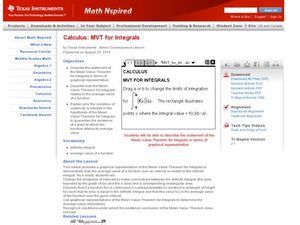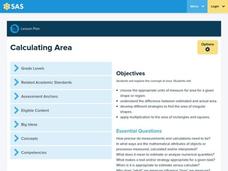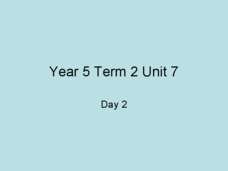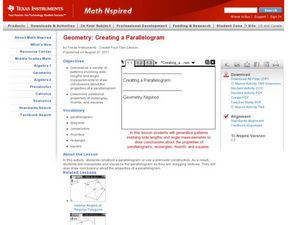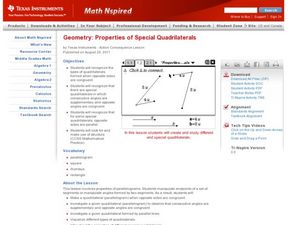Curated OER
MVT for Integrals
Students identify the meaning of the Mean Value Theorem. In this calculus lesson, students solve problems using the definite integral. They calculate the average value of a function.
Curated OER
The Chicken Run
Fourth graders work in a group of 4 to make rectangle with a 12m length of string. They discuss its perimeter and how they would calculate its area. Then another group of 4 make another rectangle and estimate if the area would be greater...
Curated OER
Cut It Out
Sixth graders derive an original formula for calculating the area of an irregular figure.
Curated OER
Measurement: Lesson 2
Eighth graders complete math problems given in this lesson, where they find the perimeter and area of specific figures. They estimate the perimeter and area of shapes and figures and then complete the mathematical formula to find the...
Curated OER
Creating Gardens
Students are shown that numeracy is all around them. They use volume, and calculate the quantity of soil required to make a garden to given instructions. Students are asked how to calculate the amount of soil required for the garden.
Curated OER
What a Square
Students examine the painting "Old Man With A Gold Chain" by Rembrandt. They identify geometric shapes in the painting, measure these shapes and compare the relationships of these measurements.
Pennsylvania Department of Education
Multiplication Using Arrays
Explore the concept of multiplication by using arrays. Classmates use arrays to gain a better understanding of multiplication. They break arrays apart to model the distributive property of multiplication over addition. The relationship...
Virginia Department of Education
Order Up!
Order in the math class! Scholars learn to evaluate expressions using the order of operations. A game has them rolling number cubes to determine numbers to use when evaluating.
Curated OER
Which container holds a larger amount of popcorn?
What does popcorn have to do with math? Seventh grade mathematicians are provided an opportunity to develop a conceptual understanding of the formula for volume and to use it as a tool to solve problems. The lesson begins with a...
Curated OER
Exploring the Properties of Rectangular Prisms.
Students define properties of rectangular prisms. For this geometry lesson, students identify the relationship between two and three dimensional objects. They use Cabri technology to graph their figures.
Curated OER
Exploring Properties of Rectangular Prisms
Students explore the properties of rectangular prisms. In this geometry lesson, students identify properties of two and three dimensional shapes. They use Cabri technology to create polygons and solve problems.
Pennsylvania Department of Education
Making Cubes
Third graders explore vocabulary associated with three dimensional figures. In this transformations lesson plan, 3rd graders create two dimensional nets for three dimensional figures. Students become familiar with describing two and...
Curated OER
Naming Geometric Shapes
Name that shape! This simple instructional activity has learners identify each geometric figure. They examine rectangular prisms, cylinders, rectangular pyramids, and hexagonal prisms. This one-page instructional activity contains 8...
Curated OER
Year 5, Term 2, Unit 7
Here is a challenging presentation which should be tough for even your top math learners. In it, pupils view 86 slides which take them through many mathematical concepts such as doubling, halving, decimals, word problems, and converting...
Mathematics Vision Project
Module 5: Modeling with Geometry
Solids come in many shapes and sizes. Using geometry, scholars create two-dimensional cross-sections of various three-dimensional objects. They develop the lesson further by finding the volume of solids. The module then shifts to finding...
Santa Barbara City College
How to Make a Multiplication Table
Teach children how to make a multiplication table, and they'll be multiplying for life. Following this series of steps, young mathematicians learn to use patterns and the relationships between numbers to create their very own...
Curated OER
Linear Equations
Eighth and ninth graders solve and graph 42 different problems that include writing various equations and graphing them on a grid. First, they create a table for each equation and graph it on a grid locating the x-and y-intercepts. Then,...
Curated OER
Pythagorean Theorem by Graphic Manipulation
There are many different ways to show a proof of the Pythagorean Theorem. Here is a nice hands-on paper cutting activity that shows a graphic representation. You can even challenge your young Pythagoreans to come up with their own...
Illustrative Mathematics
Why Randomize?
Your statisticians draw several samplings from the same data set, some randomized and some not, and consider the distribution of the sample means of the two different types of samplings. The exercise demonstrates that non-random samples...
CPM
Unit 3, Worksheet 1, Exponents and Algebraic Expressions
Need exponentt practice? Then this exponent worksheet will be helpful to have learners evaluate exponent expressions and algebraic expressions. They use the distributive property to solve equations. This three-page worksheet contains...
Curated OER
The Bell Curve
Learners are introduced to the concepts of the normal curve, skewness and the standard deviation. They discuss how the normal distribution has been used and misused to support conclusions.
Pennsylvania Department of Education
Length and Perimeter
Third graders explore tessellations and the spatial concepts used in creating them. In this tessellations lesson, 3rd graders rotate, reflect and transform shapes to create tessellations. Students become familiar with the vocabulary...
Curated OER
Creating Parallelogram
Learning how to define vocabulary words related to solving parallelograms will assist your learners in identifying different parallelograms. They use the navigator to view different shapes created by moving the parallelogram around.
Curated OER
Properties of Special Quadrilaterals
Teach your mathematicians how to identify the properties of quadrilaterals. In this geometry instructional activity, young scholars solve for missing angles and sides of a special quadrilateral. They use the TI to move the sides around...


